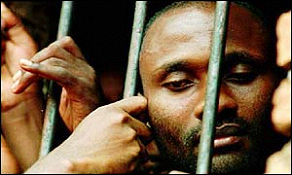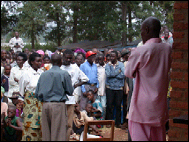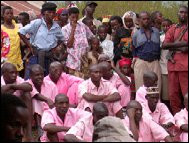 Gacaca
System Gacaca
System |

250,000 new judges
11,000 jurisdictions
115,000 defendants
Gacaca is a locally-based system of justice developed
by the Rwandan government to try to cope with the
thousands of genocide suspects still being held
without trial - eight years after the genocide in
Rwanda.
The word "gacaca" refers to the small
lawn where elders in a village would congregate
to solve disputes.
The primary objectives of the new system are:
- to bring an end to the drawn out and painful
process of trying genocide suspects.
- to bring about national reconciliation.
- to help speed the healing of the mental wounds
of the survivors and the families of those who
were killed.
Gacaca is the Kinyarwanda word for grass and
the courts have been developed from traditional
forms of resolving family and community conflicts.
The judges in the courts, elected on a local
basis in October 2001, come from among the local
communities and will deliberate on the cases
of suspected involvement in genocide from their
own areas.
There are at least 115,000 suspects being
held in overcrowded and unsanitary jails in
Rwanda.
The Rwandan Justice Ministry has been
trying to bring their cases before the existing
court system but progress has been slow and
the ministry has said it could take 100 years
to try all the suspects being held.
The International Court in Arusha is trying 50
cases of those accused of planning or organising
the genocide.
Rwandan President Paul Kagame has said that Rwanda
needs a more rapid solution than the Rwandan and
International courts can provide. The gacaca system
has been set up to achieve this.

 CATEGORIES CATEGORIES |
The gacaca system will try detainees accused
of offences in categories 2 through 4 of
Rwanda's genocide legislation.
Category 1 relates to the most serious
genocide offences and includes individuals who
allegedly organized, instigated, led or took a
particularly zealous role in the violence. Category
1 defendants will continue to be tried by the
formal court system.
Category 2 includes alleged perpetrators
of or accomplices to intentional homicides or
serious assaults that led to death. Category 2
defendants who do not confess face maximum terms
of imprisonment of between 25 years and life if
convicted.
Category 3 contains persons accused of
other serious assaults against individuals.
Category 4 covers persons who committed property
crimes. |
 How
the system will work How
the system will work |
Genocide suspects being held in prison will
be taken to the areas where they are suspected of
having taken part in the attempted genocide
Local prosecutors will present the charges
and the elected judges will decide on the guilt
or innocence of the accused. Suspects can confess
to crimes they have committed, plead guilty and
receive reduced sentences.
The courts will not try those suspected
of initiating or planning the 1994 genocide (they
are being tried by the UN-created International
Criminal Tribunal for Rwanda in Arusha, RWANDA,
or by the formal Rwandan justice system).
Those accused of killings, violence, being
accomplices to genocide or looting will tried.
A person found guilty of murder could receive
a sentence of six years in prison followed by
community service. This means that some of those
held in prison since the 1994 genocide could be
released immediately even if found guilty.

Gacaca Courts:
- The courts will each have 19 judges.
- They are not legally qualified but were elected
by Rwandans registered to vote in October 2001.
- An estimated 90% of the electorate cast their
votes, the majority in favour of the system.
- Judges had to be known for their honesty,
good conduct and integrity and be free of any
suspicion of involvement in genocide, according
to the Rwandan Justice Ministry.
- Judges have received training in the operation
of the courts since their election.
- The accused will not have legal representation
but can present their own cases.
- Criticism of the courts has come from the
Rwandan Organisation the Rally for the Return
of Refugees and Democracy in Rwanda. It has
called the gacaca courts "mob justice".
- Surveys by foreign legal experts have revealed
that some Rwandans fear that the courts will
bring to the surface old fears and hatreds and
that there is a danger of intimidation of witnesses.
- President Kagame says it could take five years
to process most of the cases because of the
huge backlog.
- There are 11,000 courts across the country
to deal with at least 115,000 cases and it is
impossible to estimate how long each case will
take.
|

